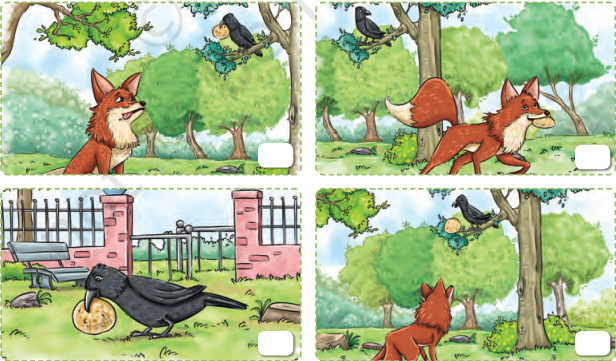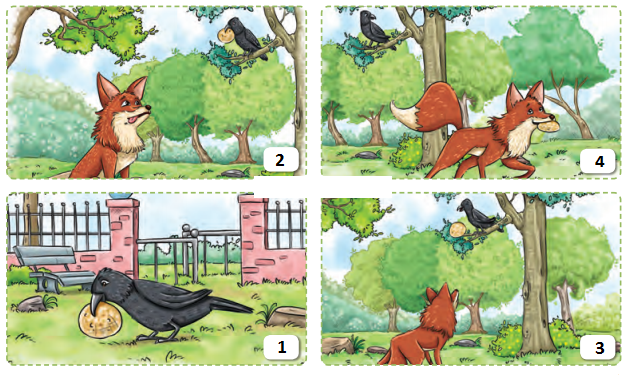Solutions For All Chapters – English Poorvi Class 6
The Raven and the Fox – Part 2
Question 1. We know that frogs croak. Did you know that ravens also croak?
Answer: Yes, I know this fact about Ravens, as crows also croak.
Question 2. Which animal is shown to be cunning in stories? Circle the correct answer.
(a) tiger (b) fox (c) bear
Answer: (b) fox
Let us discuss
1. Fill in the blanks by choosing the correct option:
(a) Stanza 1
1. Mr. Raven is a bird. (bird/frog)
2. The name of the fox is Reynard. (Raven/Reynard)
3. Mr. Raven had a piece of food in his beak. (a piece of food/a bunch of leaves)
(b) Stanza 2
1. The Fox calls the Raven a good-looking bird. (foolish/good-looking)
2. The Fox asks the Raven to sing. (dance/sing)
3. The Raven and the Fox live in the woods. (trees/woods)
(c) Stanza 3
1. The Raven forgot that he croaked. (remembered/forgot)
2. The Raven opened its beak to sing. (eat/sing)
3. The food fell down. (food/Raven)
(d) Stanza 4
1. The Fox laughed at the Raven. (laughed/looked)
2. It is not wise to be too proud of oneself. (wise/unwise)
3. The Raven learned a lesson. (lesson/teaching)
2. Read the poem again and match the words in Column A with their meanings in Column B. Check your answers with your teacher and your classmates.
| Column A | Column B |
| 1. perched | (d) sat on a branch |
| 2. morsel | (a) a small piece of food |
| 3. seek | (e) to look for something |
| 4. pride | (c) feeling that you are better than others |
| 5. eyed | (b) looked with interest at something |
| 6. limb | (g) branch of a tree |
| 7. woods | (f) a smaller area of forest with similar kinds of trees |
Let us think and reflect
1. Look at the pictures and number them in the order that they happen in the poem.
Answer: Sequence of the Picture:
Question 2. Read the following lines and answer the questions that follow.
(a) Sir Raven, you are a handsome bird.
Such feathers! If you would only sing,
The birds of these woods would call you King.
(i) ‘Such feathers’ refer to _______ feathers.
(a) shiny and beautiful
(b) black and dull
(c) grey and long
(d) short and unattractive
Ans : shiny and beautiful
ii.) Why would the birds of the woods call the Raven ‘King’?
Ans. The birds of the woods would call the Raven ‘King’ because of his beautiful feathers and melodious voice. Reynard, the Fox was trying to praise him and make a fool of him so that he could get the food from Mr. Raven.
iii) Why does the Fox address the Raven as ‘Sir’?
Ans. The Fox addresses the Raven as ‘Sir’ to flatter him and make him feel important. This was part of the Fox’s plan to trick the Raven into opening his beak and dropping the food.
(b) The Raven, who did not see the joke,
Forgot that his voice was just a croak.
He opened his beak, in his foolish pride–
i) Why did the Raven open his beak?
Ans. The Raven opened his beak to sing, believing the Fox’s flattery that he had a beautiful voice, forgetting that his voice was actually a croak.
ii) Complete the following with one word from the given lines.
Fox: clever : : Raven: foolish
3. Why does the Raven forget that his voice is just a croak?
Ans. The Raven forgets that his voice is just a croak because he was flattered by the Fox’s praise and became overly proud, losing his sense of reality.
4. How does Reynard make the Raven sing?
Ans. Reynard, the Fox, makes the Raven sing by flattering him and telling him that he would be the king of the birds if he sang. This inflated the Raven’s pride, making him want to show off his voice.
5. Why does Reynard say that pride is not wise?
Ans. Reynard says that pride is not wise because it makes people blind to reality and susceptible to flattery, which can lead to their downfall, just as it did for the Raven.
6. Give one reason why the teaching is quite a surprise.
Ans. The teaching is quite a surprise because the Raven realizes too late that he was tricked by the Fox’s flattery and that his pride led to his loss, not his gain.
7. Imagine someone praises you too much. How would you react?
Ans. If someone praises me too much, I would remain cautious and not let it affect my judgment. While it’s nice to receive compliments, it’s important to stay grounded and not be swayed by excessive flattery.
Let us learn
Question 1. Write the rhyming words from the poem. One has been done for you.
Stanza 1
(a) limb-him
(b) beak-seek
Stanza 2
(a) word-bird
(b) sing-King
Stanza 3
(a) joke-croak
(b) pride-eyed
Stanza 4
(a) know-glow
(b) unwise-surprise
Question 2. Study the underlined words in the poem.
(a) For the Raven held in his great big beak.
The words ‘big’ and ‘beak’ begin with the same /b/ sound.
(b) The song of sweet birds.
Alliteration is a repetition of consonant sounds at the beginning of words. When two or more words together, begin with the same sound, it is called alliteration.
Now, pick another example of alliteration from Stanza 2.
Answer: sing-king
3. Choose the correct opposites from the box given below and complete the table. There are two extra words that you will not need
wise, happy, humility, flew, remembered, notice, dim, cried, silly
| Words | Opposites |
| 1. Perched | Flew |
| 2. Forgot | Remembered |
| 3. Foolish | Wise |
| 4. Pride | Humility |
| 5. Laughed | Cried |
| 6. Ignore | Notice |
| 7. Glow | Dim |
Let us listen
You will listen to what the crow did after he lost his food. As you listen, mark the given statements as True or False. (refer to page 37 for transcript)
(a) The crow was unhappy that he lost his food. TRUE
(b) The crow thought that his lovely feathers made him smart. FALSE
(c) The crow wanted to tell his friends not to be proud. TRUE
Let us speak
Narrate the poem in the form of a story. Give a different ending to the story. You may begin like this:
This is a story about a clever fox named Reynard and Mr Raven. One day…
Answer:
This is a story about a clever fox named Reynard and Mr. Raven. One day, Mr. Raven was sitting on a tree branch with a tasty morsel of food in his beak. Reynard, noticing the food, flattered Mr. Raven by praising his beauty and suggesting that if he sang, all the birds would crown him as king.
Flattered and proud, Mr. Raven was about to open his beak to sing when he remembered to be careful. Instead of letting the food drop, he held onto it tightly and gave a loud, croaky caw. Realizing his trick had failed, Reynard smiled and acknowledged Mr. Raven’s wisdom. Mr. Raven then flew away with his food, proud of his cleverness, leaving Reynard to find his own meal.
The story teaches that wisdom and thinking before acting are more important than falling for flattery.
Let us write
Now, write the story you narrated in the form of a conversation.
(Remember to write only the actions for the Raven as he has food in his mouth and does not speak.)
You may begin like this.
Reynard: Good morning, Mr Raven! You seem to be awake so early!
(Mr Raven just nods his head)
Reynard: Oh, Mr Raven, you look …
Answer:
Reynard: Good morning, Mr. Raven! You seem to be awake so early!
(Mr. Raven just nods his head)
Reynard: Oh, Mr. Raven, you look so handsome today! Your feathers are simply magnificent.
(Mr. Raven puffs up his chest proudly)
Reynard: You know, with such beautiful feathers, you must have a lovely singing voice. If you would only sing, the birds of these woods would surely call you King.
(Mr. Raven, feeling proud, opens his beak to sing. The morsel falls to the ground, and Reynard quickly grabs it.)
Reynard: Ha-ha! And now you know, ignore sweet words that make you glow. Pride, my friend, is rather unwise; I’m sure this teaching is quite a surprise.
(Mr. Raven looks embarrassed but then has an idea. He flies down to Reynard and looks at him expectantly.)
Reynard: What’s this, Mr. Raven? Do you have something to say?
(Mr. Raven points to the morsel and then to himself and Reynard, trying to indicate sharing.)
Reynard: You want to share the food? Hmm, that’s an interesting proposal.
(Mr. Raven nods eagerly)
Reynard: Very well, Mr. Raven. Let’s share the food. It seems we both can learn something from each other.
(Mr. Raven and Reynard sit together, sharing the morsel. They both realize that cleverness and kindness can coexist and from that day on, they become friends.)



Leave a Reply